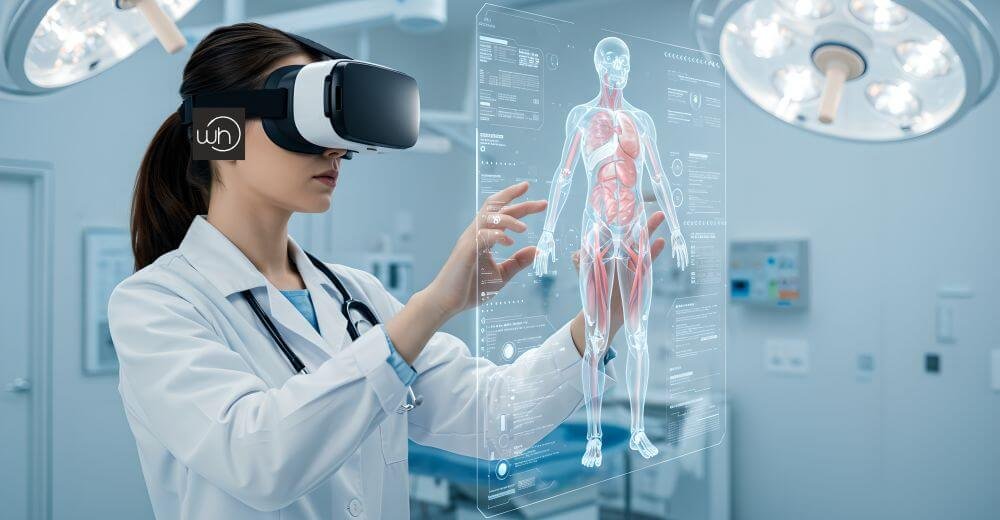The Digital Doctor
Very soon, technology will transform how we receive healthcare. Video Doctor visits, smart devices, personalized treatments, and things like that are making the concept of a digital doctor a reality. The new tools are not only useful, they are making care faster, more convenient to access and more personalized.
Telemedicine: Medicine Without Frontiers
Perhaps the largest change in recent memory has been the expansion of telemedicine. Online doctor visits are a product of the COVID-19 pandemic days, and now millions of people consider them the standards. Patients can now meet physicians at the comfort of their homes without having to add to the equation the travelling time, the waiting area and the possible transmission of a contagious disease.
Aside from convenience, telehealth offers the critical benefit to those in remote or underserved communities. Those who live in rural areas, lacking specialists within easy reach, can now call upon specialist advice in real-time. Mental health treatment has also undergone a seismic shift towards virtual delivery, eliminating stigma and access barriers.
Artificial Intelligence: The New Diagnostic Assistant
AI is revolutionizing diagnostics. Medical scans — X-rays, MRIs, and CT scans — are more and more often being read by algorithms with accuracy that is simply breathtaking, often comparable to or even surpassing that of human doctors. For instance, Google’s DeepMind developed AI systems that are as good as the world’s top eye experts in identifying over 50 eye diseases.
AI is also used in the detection of cancer at an early stage, predictive modeling, and the discovery of drugs. By studying large patient datasets, AI can identify patterns and risk indicators that are not easy to notice for humans. This results in conditions like sepsis, heart disease, or cancer getting detected earlier where results are highly improved.
Wearable Technology and Remote Monitoring
Medical-grade standards wearables, smartwatches, and fitness trackers are no longer just stylish pieces of gadgetry. They are now significant parts of preventive medicine. They are able to monitor heart rate, blood oxygen saturation, sleep, and even an abnormal heart rhythm like atrial fibrillation.
In chronically diseased patients, for example, hypertension or diabetes, round-the-clock monitoring of vital signs is made possible through home monitoring. Early data facilitates individualized care plans and early intervention, lessening hospitalization and enhancing the quality of life.
Robotics and Surgery
The use of robotically assisted procedures is getting increasingly becoming familiar in operating rooms across the world. These robots are operated by highly trained doctors and provide precision, lesser incisions and quicker recovery which is unmatched. Robotic technology like the da Vinci Surgical System makes prostatectomy, heart valve replacement and even brain surgery safer and more successful.
In addition, robots are nowadays finding a wide application in hospitals to perform tasks like room cleaning, dispensing drugs or providing assistance therapy in rehabilitation processes – leaving the human health experts to pursue other high-level tasks.
Personalized and Predictive Medicine
The physician of the future in the digital world will not only heal sickness — it will forecast disease before it even begins. With genomics and analytics, medicine is being moved in the direction of individualized medicine, where drugs are tailored according to an individual’s gene code, habits, and environment.
For instance, pharmacogenomics allows doctors to know the best drug for a patient from their genetic profile. This eliminates the trial-and-error process of prescribing and reduces drug side effects.
Blockchain for Health Records
Safe, efficient handling of patient records is another field where technology is making waves. Blockchain, the base tech behind those cryptocurrencies, is already being explored to create unchangeable, decentralized medical histories. It enables patients to control more of their own data and doctors practicing across different systems to have access to complete, accurate histories — improving coordination and quality of care.
Challenges and Ethical Considerations
Despite such a positive development, digitization of healthcare faces challenges. Chief among them are digital divide, data privacy, and cybersecurity. Not everyone can afford the high-speed internet or the expertise to make best use of telehealth services. Beyond that, with algorithms and artificial intelligence being more frequently used for diagnosis, accountability and transparency issues take center stage.
Health care providers need to be careful not to become too dependent on technology. Regardless of how great computer resources are, they can never compare with the judgment and compassion that good medicine is founded on.
The Future is Now
Technology is no longer an adjunct to medicine — it’s becoming its backbone. The “digital doctor” is no legend; it is the reality that is actually unfolding in hospitals, clinics, and homes on a daily basis. As technologies continue to advance further, the focus must remain on accessibility, safety, and human-focused design. With smart application, technology can bridge gaps, save lives, and construct a more robust, responsive healthcare system for all.





